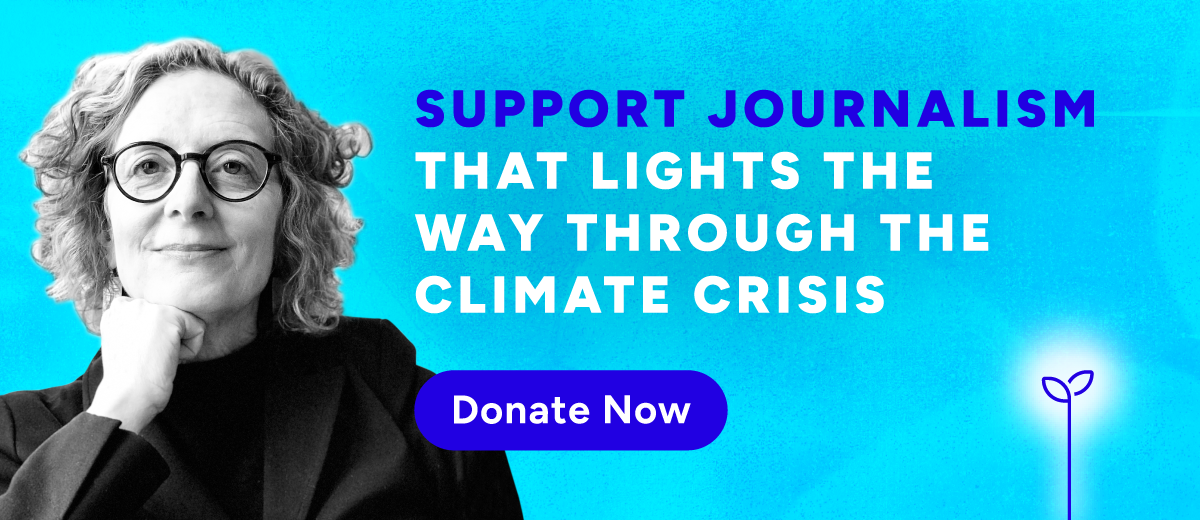Support strong Canadian climate journalism for 2025
Since I last wrote to you, Canada’s National Observer has survived Meta’s news ban, published hundreds of articles on federal policy, climate solutions and Indigenous efforts in the race against climate change, and shone a light on youth leading their generation as climate advocates. We’ve gone hard on greenwashing by the gas and oil industry and investigated insurance companies' increasingly reluctant stance on coverage for homes in wildfire-prone areas.
We’ve released The Poison Detectives, a five-part podcast on how a chemical substance in gear firefighters wore to protect themselves actually caused cancer. We celebrated when Apple featured The Poison Detectives on its top show list, then moved it to “New and Noteworthy,” where it remained for weeks. More than 100,000 people have downloaded our podcasts. The same number have viewed our videos on TikTok. Four million read our investigative and solutions journalism on climate.
But as you know, oil and gas companies are fighting hard to protect the status quo, planet be damned. As we reported in April, overall, the percentage of Canadians who describe climate change as human-caused has declined from 71 per cent in 2021 to 62 per cent today. And there’s widespread confusion about fossil fuels as a prime cause of climate breakdown. “Canadians overwhelmingly understand we will need more electricity and say they want it to come without carbon pollution. But two-thirds simultaneously support building gas plants,” Zero Carbon correspondent Chris Hatch wrote in CNO after reviewing the recent nationwide polling results.
And just this week, we shared a report that numerous experts feel hopeless, enraged and scared by the failure of governments to act.
This is the state of the warming world we live in and it underscores the critically important role CNO must continue to play in fighting disinformation, holding corporations and governments to account and documenting a sane path forward. That is why I am coming to you this month to ask for your help. Journalism is expensive.
Climate journalism is challenging work. Day after day, our reporters must confront an existential threat head-on without flinching or turning away. Still, we love what we do.
Our journalism isn’t done in isolation. You are absolutely critical to our success in carrying out our mission to keep the climate conversation front and centre in Canada. I need to raise $100,000 over the next four weeks to make our budget numbers work. I can’t do it without hundreds of you. Might you pitch in?
Our work is valued by hundreds of thousands of readers and this is what keeps me striving to ensure resources are there for the next phase of our work. Hearing comments from readers, like this one someone recently sent to our lead columnist Max Fawcett after he won the top award in Canada for column writing, is just one example: “You are my daily dose of common sense in a sea of chaos.”
I was also thrilled to hear the work of Ottawa senior reporter John Woodside referenced in the House of Commons by an NDP MP for a story suggesting Finance Minister Chrystia Freeland has been trying to slip fossil fuels into clean investment definitions.
I love it when I can point directly to the impact we are having together as a community, particularly when it’s crystal clear we are providing information that empowers people to take action. Likewise, it was wonderful to hear Peter Mansbridge on his podcast, The Bridge, tell Chris Hatch what an exceptional climate journalist he is.
Every morning, we deliver comprehensive, original news about Canada's changing climate through our dedicated publishing platform, our app, (available in the Apple and Google stores), and our array of engaging newsletters, podcasts and TikTok videos.
We’ve come so far and accomplished so much, but there’s further I believe we must go, and we can only get there with your support.
Here’s a snapshot of just three of the dozens of critical questions our journalism will answer for readers over the next six months.
What are the solutions to quickly increase housing stock and address the building sector’s impact on the climate?
What is needed for Canada’s EV transformation to happen faster and better?
Demand for clean power is about to explode as Canada moves toward a fossil fuel-free future. What are the solutions to get us where we need to go in time?
I’ll say it again: We’ve come very far, but we must go much further. We can only do this side-by-side with you. So help me reach our goal of raising $100,000 by June 3. I promise that with your support, we’ll give you work that will have a wide-ranging impact on people and the planet. I believe our journalism can change our world for the better. It won’t be easy, but it will be worthwhile.
Please give what you can. Thank you ahead of time.
Until June 3, become a subscriber for only $49.99 (that's 64% off) during our spring subscription drive and read all of our climate coverage.



Comments